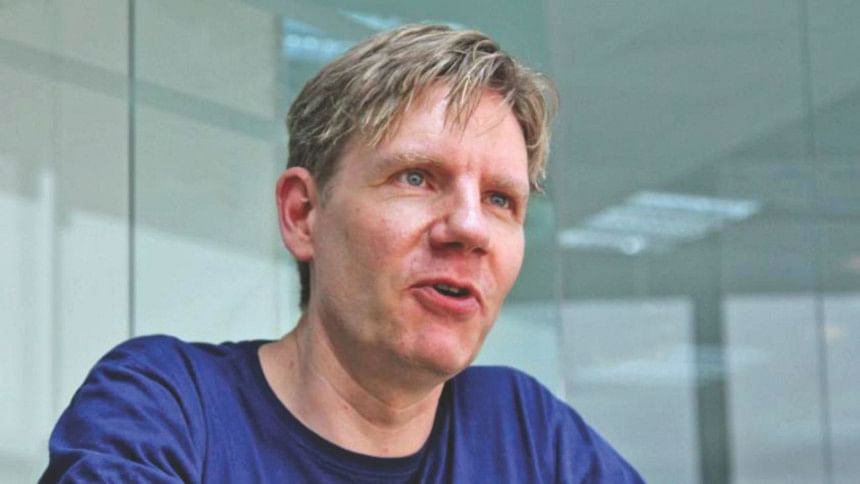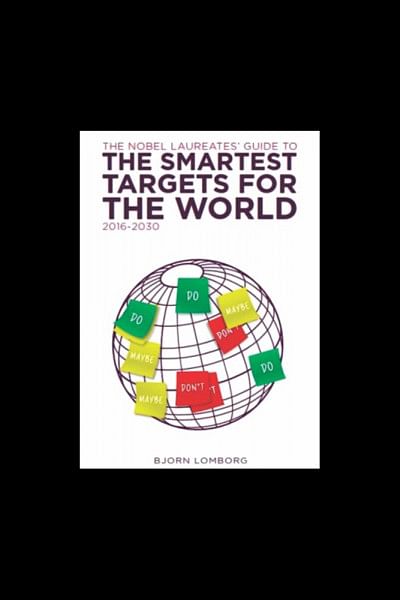“The chief problem with trying to do everything at once is that we end up doing very little at all.”

Dr. Bjorn Lomborg, the President of the Copenhagen Consensus Centre, a top ranked think tank and one of TIME magazine's 100 most influential people, shares with Amitava Kar the ideas behind and the goal of the Bangladesh Priorities project--prioritising development solutions through a cost benefit analysis
Please give us a background of the Bangladesh Priorities Project which you launched during your visit to Dhaka earlier this year. What are the objectives?
We will engage Bangladeshis across the country to discover their views about the biggest challenges facing the country. Through this process, which will include readers of The Daily Star, along with NGOs, decision makers and businesses, we will collate a list of the top challenges for Bangladesh.
For each of the challenges, we will engage with some of the world's and region's top specialist economists, who will establish the smartest solutions along with their costs and benefits.
Using cost and benefit analysis is an innovative approach in terms of prioritising development solutions in Bangladesh, where this has not been used before.
With the new economic evidence, we can engage the country in talking about how Bangladesh and donors could best approach each of the challenges, whether healthcare or education or pollution.

We will ask Bangladeshi thought leaders, youth forums, and decision makers, to use the research to identify their priorities for investment.
With knowledge of what we can achieve with every taka, the project will focus attention on some of the smartest solutions for Bangladesh.
You commissioned research and cost-benefit analyses on 22 diverse topics of development, and were trying to redefine some of the SDGs for effectiveness and efficiency, whittling them down to a couple of dozen, down from the 169 goals set by the UN. Has that come about?
The SDGs will replace the Millennium Development Goals and influence the flow of more than USD 2.5 trillion over the next 15 years, so it's vital that we get them right.
The United Nations' process has so far created an unmanageably long list of 169 very broad global development targets. All 169 targets are well-intentioned, but setting out to balance 169 competing objectives is wrongheaded. Some achieve a lot more than others. The chief problem with trying to do everything at once is that we end up doing very little at all.
More than 80 economists at the Copenhagen Consensus Center analysed the United Nations' plans and identified the targets' costs and benefits to society. This showed that focusing on the 19 most effective targets would achieve four-times more good.
The United Nations is still debating its priorities, and will set the final list in September. We continue to engage with ambassadors and governments to share the results of our research and promote the idea of sharpening the SDG targets to a much smarter, more effective list.
Would you share with us some solutions for Bangladesh?
Identifying solutions is a process where we will be working with many different Bangladeshis, through our partner BRAC, as well as with academics, donors and NGOs and politicians. We will of course share the solutions – and all of our new research – with Bangladesh and the entire world during Bangladesh Priorities.
What kind of partnerships have you been able to build in Bangladesh? What do you need to make this project a success?
We are engaging with a really wide range of Bangladeshi stakeholders, which we think is vital. I'm really excited by the level of local interest in the project, and the new research that will create smart solutions to the biggest challenges facing the country. Our partner is BRAC, not only a Bangladeshi development success story but also a global leader and pioneer in creating opportunities for the world's poor. We will be working very closely with BRAC - and the rest of the development and policy community - to ensure that this research informs and improves the Bangladeshi conversation about priorities - and to make sure as many voices as possible are part of this vital discussion.
We would be excited to consider other partners across government, development and civil society, so I encourage those interested to get in touch via our website.
What was your motivation behind founding the Copenhagen Consensus?
I founded the Copenhagen Consensus Center in Denmark more than a decade ago because I believe that some of the world's biggest decisions made – how to improve the lives of the most needy and destitute – must be much better informed. Too often today, these decisions are made based on irrelevant things like media attention. What I set out to do with Copenhagen Consensus is to provide an answer to the question: how can we do the most good with our spending?
The Center has worked with more than 100 expert economists, including seven Nobel Laureates, to look at smarter ways of spending money on everything from climate change to healthcare. We first establish the costs and benefits of different ways of spending money – if you imagine development priorities as a menu, what we do is make sure that each item on that menu has a price-tag and description attached. Then we go the next step and explore which investments should be prioritised and which ones should not.
Today, the Center is internationally recognised for using economic science to identify the full range of social, environmental and economic benefits of competing investment choices, and for injecting rational facts into heated policy debates.

 For all latest news, follow The Daily Star's Google News channel.
For all latest news, follow The Daily Star's Google News channel. 



Comments